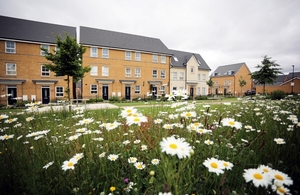Carolyn Wilkins appointed to the Financial Policy Committee
The Chancellor of the Exchequer, Rishi Sunak, has today announced the appointment of Carolyn Wilkins as an external member of the Financial Policy Committee (FPC).
Carolyn has 20 years of experience working in a central bank at the Bank of Canada, most recently as Senior Deputy Governor. Her appointment fills the external position previously held by Donald Kohn, who stepped down from the Committee at the end of March 2021. She will serve a three-year term, which will begin on 21 June 2021.
The Chancellor of the Exchequer Rishi Sunak said:
The FPC plays a crucial in role in protecting and enhancing the resilience of our financial system. I want to thank Donald Kohn for his tremendous contribution to the FPC’s work over the past ten years. I am pleased to appoint Carolyn Wilkins to the committee – Carolyn has a respected track record built over 20 years at the Bank of Canada and her extensive experience in international financial regulation will be a real asset to the FPC.
The Governor of the Bank of England, Andrew Bailey said:
Don’s contribution to the work of the FPC cannot be overstated. As one of the FPC’s original members his valuable expertise and insight on macroprudential policymaking and its evolution over the years has been integral to the Committee’s work.
I am delighted to welcome Carolyn to the FPC as an external member. Her senior leadership positions at the Bank of Canada, most recently helping drive the Bank’s response to the Covid-19 crisis, and extensive knowledge of the global financial system, means she will bring fresh analysis and valuable input to the Committee’s deliberations.
Further information
Prior to this appointment, Carolyn A Wilkins had a distinguished twenty-year career at the Bank of Canada, serving as Senior Deputy Governor from 2014 to 2020, setting monetary and financial system policies with the Governing Council, and overseeing strategic planning and economic research. Ms. Wilkins led the development of the Bank’s market liquidity facilities and large-scale asset purchase program as part of its COVID-19 response. She has made important contributions to international financial policies over her career, most recently as the Bank of Canada’s G20 and G7 Deputy and member of the Financial Stability Board. Ms. Wilkins has published and spoken on a broad range of international issues, including economic resilience, global financial regulation, and Fintech. Ms Wilkins was recently appointed to the Board of Directors of Intact Financial Corporation, a provider of property and casualty insurance in Canada and a provider of specialty insurance in North America.
About the appointment process
Carolyn Wilkins has been appointed following an open recruitment process. As part of this process, HM Treasury recruited an executive search agency. A panel comprising of Charles Roxburgh (non-voting member of the FPC and Second Permanent Secretary, HM Treasury), Katharine Braddick (Director General of Financial Services, HM Treasury) and Martin Taylor (external member of the FPC from 2013 to 2020) interviewed a number of candidates and made recommendations to the Chancellor, which informed his decision.
There were 20 applications, of which eight candidates were shortlisted for interview. The gender breakdown for this appointment is below:
| Application stage | Shortlisted for interview | |
|---|---|---|
| FPC External Member | 7 women, 10 men, 3 undisclosed | 5 women, 3 men |
About the Financial Policy Committee
- the FPC is the UK’s macroprudential regulator: its objective is to protect and enhance the stability of the UK’s financial system by identifying, monitoring and addressing systemic risks
- the FPC has thirteen members. Six of them are Bank of England staff including the Governor and four Deputy Governors
- there are also five external members who are selected from outside the Bank for their experience and expertise in financial services
- the Committee also includes the Chief Executive of the Financial Conduct Authority and one non-voting member from HM Treasury
- External members sit on a part-time basis and are employed on the basis of having knowledge or experience which is likely to be relevant to the Committee’s functions. The Bank have robust procedures in place to monitor and manage any actual or potential conflicts of interest to ensure the independence, integrity and impartiality of the Committee, and avoid any perception that a Committee member may obtain an unfair advantage through their association with the Committee.
